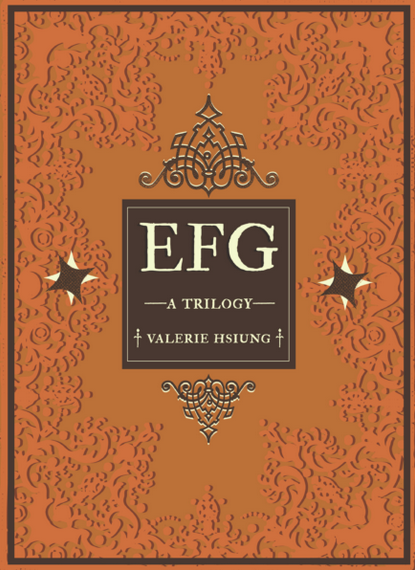Books
e f g, (Action Books, 2016)
e f g

e f g is a book of poetry by artist Valerie Hsiung.
Date: December 1, 2016
Publisher: Action Books
Format: Print
Genre: Poetry
Order from Asterism, Bookshop, McNally Jackson, Brazos Books & Action Books
Review in 3AM Magazine
Praise
“Valerie Hsiung is a very prolific writer whose poems have great tonal, mood, vocal scale—that lower limit speech/upper limit music of which Zukofsky spoke. She can also express exasperation and alacrity in the space of a single short poem. The words seem simple, but their moment of appearance is rarely expected. Too wise to be innocent and too fresh to be gnarly, she eases you into her bold stances. She is one of those poets you wish were more populous for they pull you up by the hair roots and remind you living is serious business, and the whole world is in our dirty little hands. Every morning requires finding the key to our handcuffs, a splash of cold water, and a dash to insure the morning’s feasibility.”
- CD Wright
“No matter in what tradition, genre, or period, one of the traits all anabasis literature shares in common is the obligation to be at once familiar, bizarre, and transportive. The place (which in Hsiung’s hands is its own manifold utterance) must spiritually and physically convince for in Hell(as with this world) conditions demand that the body and spirit be wayfarers together. In Valerie Hsiung’s e f g (immediately the title is one of its beautiful agonies) a system of eruptions, lyric cycle, and Hsiung’s signature adamant patience fall together into an underworld where the fact of predecessors (both mythic and literary) abound in the same industrious and orchestral way cells in a living structure do. e f g is made out of instinct, fortitude, tribute, and a blasting poetical vision already years in the making and very much its own.”
- Peter Richards
“Valerie Hsiung is a very prolific writer whose poems have great tonal, mood, vocal scale—that lower limit speech/upper limit music of which Zukofsky spoke. She can also express exasperation and alacrity in the space of a single short poem. The words seem simple, but their moment of appearance is rarely expected. Too wise to be innocent and too fresh to be gnarly, she eases you into her bold stances. She is one of those poets you wish were more populous for they pull you up by the hair roots and remind you living is serious business, and the whole world is in our dirty little hands. Every morning requires finding the key to our handcuffs, a splash of cold water, and a dash to insure the morning’s feasibility.”
- CD Wright
“No matter in what tradition, genre, or period, one of the traits all anabasis literature shares in common is the obligation to be at once familiar, bizarre, and transportive. The place (which in Hsiung’s hands is its own manifold utterance) must spiritually and physically convince for in Hell(as with this world) conditions demand that the body and spirit be wayfarers together. In Valerie Hsiung’s e f g (immediately the title is one of its beautiful agonies) a system of eruptions, lyric cycle, and Hsiung’s signature adamant patience fall together into an underworld where the fact of predecessors (both mythic and literary) abound in the same industrious and orchestral way cells in a living structure do. e f g is made out of instinct, fortitude, tribute, and a blasting poetical vision already years in the making and very much its own.”
- Peter Richards
“What blows through a torn mother earth is inhaled in lines that act as both channels and chatter, whose tone is unredemptive. The emotion comes from its clamour. Voices clang and chime. Violence clangs and chimes. I detect ventriloquism in nearly every poem—dead or disembodied voices laid into each other, sometimes lyric, sometimes scavenged. Sometimes the voices feel pained, other times they kid. They enact their history without making claims to it: “The sky had perforated for / a biological reason once again, / once again.” They offer the virtual not as a possible escape, but rather the process of turning inside-out. A body turned inside-out. Written on, scribbled over, skinned. Palimpsests to be read or translated by the living, who in the act of reading become conduits for the dead. [...] An American history seeks to extinguish the natural in exchange for the chemical, plastic or reproducible, the virtual—as a form of management.”
- MJ Gette
- MJ Gette